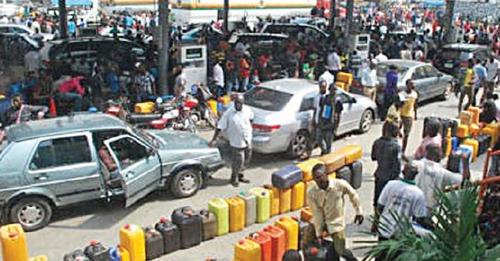Nigeria
Fuel shortages hurt more, marketers blame NNPCL

• IPMAN will sell gasoline at N270 per liter as the supply gap develops and persists.
• Oil output is at 1.52 million barrels per day, according to NNPC GMD.
Oil merchants have accused the Nigerian National Petroleum Company Limited of politicizing the supply process and making empty promises as the country’s ongoing gasoline shortage persists.
Despite Hubb Stocksman, the managing director of NNPCL Retail, having promised them in December that they would start receiving direct product supply at the government-regulated price of N148 per liter starting this month, the oil marketers operating under the Independent Petroleum Marketers Association of Nigeria claimed they had obtained fuel.
“There hasn’t been any product supply as of now.” The dude (Stockman) has been in Nigeria for a while, so he’s definitely outplaying us. He’s playing politics, and we don’t see things improving anytime soon, according to IPMAN Chairman Akin Akinrinade of Satellite Depot.
On Wednesday, as fuel lines got worse, an IPMAN officer said this.
Akinrinade stated that as of last Friday, marketers were paying between N235 and N240 per liter for products from the depots, claiming that there was no way they would sell anything for less even within the Lagos metropolitan area.
He suggested that the Federal Government start up the refineries to allow local production. This could be a long-term solution to the problem of not having enough fuel.
“Starting up the refineries and starting local refining is the long-term option,” he stated.
Mike Osatuyi, who is the National Operations Controller for IPMAN, told the PUNCH that the threat of a fuel shortage could be gone if gasoline subsidies were taken away and the industry was deregulated.
“Deregulation and the abolition of subsidies are the long-term solutions.” Allow for a free market where vendors other than the NNPC are permitted to sell their wares. “We should wait and see because the government said the subsidy would end in June, but in the meantime, we have to make do,” he told The PUNCH over the phone.
marketers of oil
Olumide Adeosun, the head of the Major Oil Marketers Association of Nigeria, says that the fuel shortage will end when the downstream sector is opened up.
READ ALSO: Gov. Obaseki warns of the mounting death toll from Lassa disease in Edo
“After so many years of PMS subsidies, Nigerian institutions are now worse equipped to handle the current domestic energy crisis.” Queues form at stations when there is a disruption in any element of the supply chain. To lessen this wasteful subsidy, the nation must start the price deregulation process, he said.
He claims that if the nation wants to impose subsidies, they must be in sectors that are intended to aid those who need them, including transportation and agriculture, in order to lower food inflation and create more jobs for Nigerians.
“We need to find a method to liberalize supplies,” he said. To guarantee a steady, more effective supply at the best costs, we must introduce transparency and competition into the supply. Imported goods must compete with locally refined goods to strike a balance between the requirement for local refining and sustainably low pricing for Nigerians that pay costs.
There are specific models, guidelines, rules, and norms created to safeguard and sustain consumers of this type of energy and populations impacted by its supply chain. These models, guidelines, rules, and norms are used in the exploration, production, refining, and distribution of refined products, which is an international business with ebbs and flows. To appear to care for its local communities, the government and industry in Nigeria must adopt these recognized standards for health, safety, environmental protection, and quality. Cutting corners would be negligent, unreliable, and unsustainable.
On Wednesday, Lagos was still filled with long fuel lines. At stations owned by MOMAN members, some drivers were seen lining up to get fuel for N170 per liter, but IPMAN member stations hardly ever had any customers since people who could afford products offered for N250 per liter and higher were seen driving freely in and out of their (IPMAN) stations.
Findings revealed that while IPMAN members frequent private depots where prices are set by market indices, MOMAN members buy fuel directly from NNPCL at a government-deregulated price of N148 per liter.
Olufemi Adewole, the Executive Secretary of the Depot and Petroleum Products Marketers Association of Nigeria, had previously stated to The Punch that his organization’s members, like the NNPCL, were under a “recover all” regime. He added that his organization’s members had to deal with high rental costs for vessels, illegal fees, a lack of foreign currency at the official rate set by the Central Bank of Nigeria, among other issues, which contributed to rising product prices.
On his official line, NNPCL spokesman Garba Deen was unavailable to comment on the ongoing gasoline shortages.
NNPC supports subsidies.
Mele Kyari, the group chief executive officer of the Nigerian National Petroleum Company, said on Wednesday that despite spending trillions of naira on the program, the oil company was happy with the Federal Government’s policy of subsidizing Premium Motor Spirit, or gasoline.
Additionally, he stated that by the end of December 2022, Nigeria’s output of crude oil and condensates would have reached a peak of 1.52 million barrels per day.
Send one of these TripleClicks.com E-Cards to friends and family members. Learn more about E-Cards HERE.
